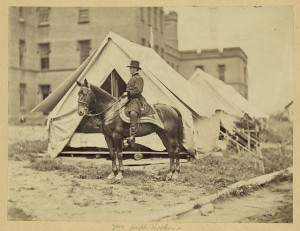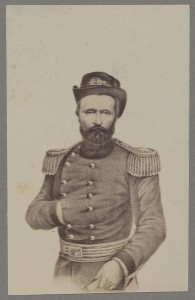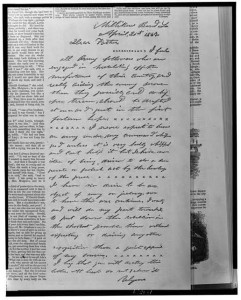The Commander-in-Chief manages some of his generals.
From The Papers And Writings Of Abraham Lincoln, Volume Six:
To GENERAL G. G. MEADE. (Private.)
EXECUTIVE MANSION, WASHINGTON, July 27, 1863.
MAJOR-GENERAL MEADE:
I have not thrown General Hooker away; and therefore I would like to know whether it would be agreeable to you, all things considered, for him to take a corps under you, if he himself is willing to do so. Write me in perfect freedom, with the assurance that I will not subject you to any embarrassment by making your letter or its contents known to any one. I wish to know your wishes before I decide whether to break the subject to him. Do not lean a hair’s breadth against your own feelings, or your judgment of the public service, on the idea of gratifying me.
Yours truly,
A. LINCOLN
TELEGRAM TO GENERAL A. B. BURNSIDE.
WAR DEPARTMENT, WASHINGTON, July 27, 1863.
MAJOR-GENERAL BURNSIDE, Cincinnati, O.:
Let me explain. In General Grant’s first despatch after the fall of Vicksburg, he said, among other things, he would send the Ninth Corps to you. Thinking it would be pleasant to you, I asked the Secretary of War to telegraph you the news. For some reasons never mentioned to us by General Grant, they have not been sent, though we have seen outside intimations that they took part in the expedition against Jackson. General Grant is a copious worker and fighter, but a very meager writer or telegrapher. No doubt he changed his purpose in regard to the Ninth Corps for some sufficient reason, but has forgotten to notify us of it.
A. LINCOLN.
Lincoln’s words about Grant might be a bit of an exaggeration – and he sure made up for lost time at the end of his life.




